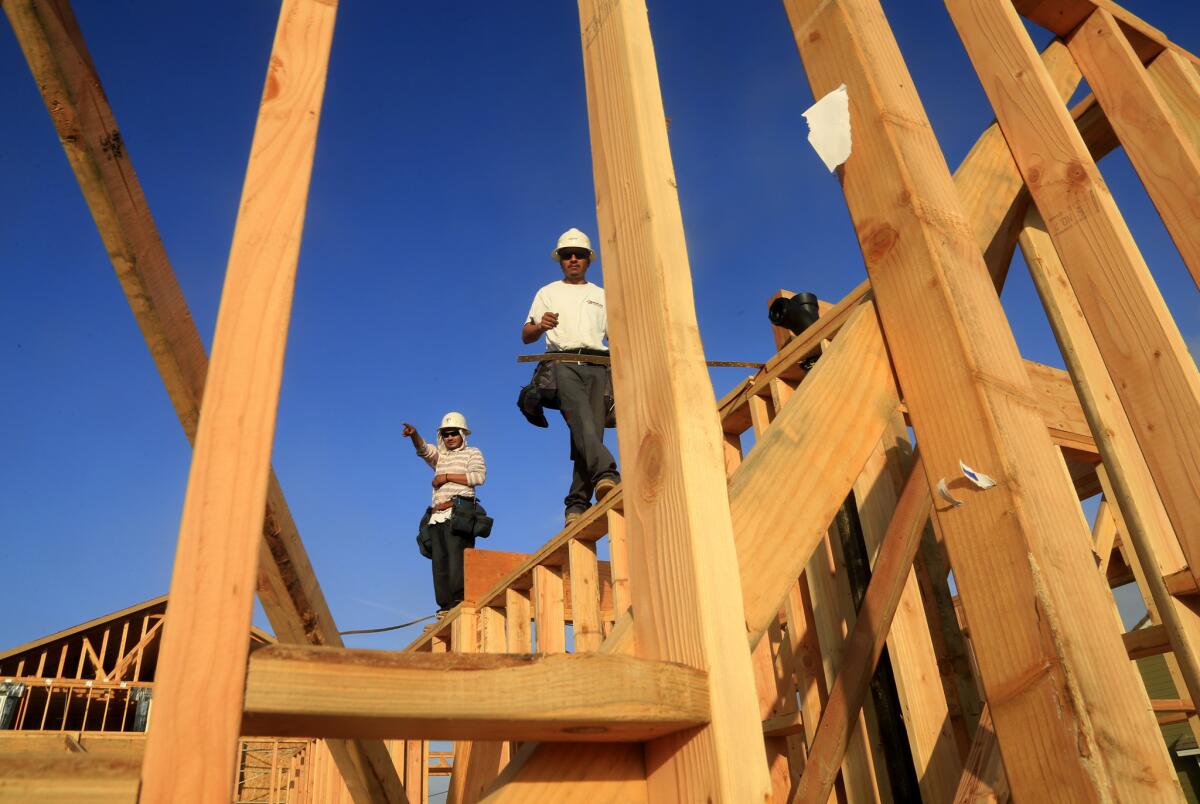Southern California must plan for 1.3 million new homes in the next decade, Newsom says

SACRAMENTO — Cities and counties in Southern California will have to plan for the construction of 1.3 million new homes in the next decade, a figure more than three times what local governments had proposed over the same period, according to a letter released by state housing officials Thursday.
The decision is sure to intensify a clash between cities in the region and Gov. Gavin Newsom over the need for new construction to alleviate the state’s housing crisis. Newsom and allies in the Legislature have called for 3.5 million new homes to be built statewide by 2025 in an effort to end a shortage of available homes that is driving up prices. Local government officials, including many in the Los Angeles area, have been frustrated by the state’s efforts to push for greater growth in their communities and to take away some of their control over development.
“The governor has said California must use every tool in its toolbox to combat the state’s housing affordability crisis,” Newsom spokesman Nathan Click said in a statement. “This is part of that approach.”
The figure cited by Newsom was governed by a 50-year-old state law that every eight years requires cities and counties to plan for enough growth in their communities to meet projected population increases and account for other factors, such as overcrowding, that indicate a need for more development. The law doesn’t require local governments to build or approve new housing, instead mandating that they must zone sufficient land to meet the state’s housing projections.
Though the law has been criticized as toothless because it does not ensure the construction of planned housing, it could push cities to zone for more growth than they’d like.
Earlier this summer, the Southern California Assn. of Governments, a public agency representing 19 million residents in Los Angeles County and five neighboring counties, proposed zoning for 430,000 new homes through 2029. Local government officials on the agency’s board lambasted the state for pushing policies that would diminish their power, including a now-stalled bill that would have required cities to allow greater development in many neighborhoods zoned only for single-family homes and those near transit lines. They worried that a large allocation from the state would provide momentum for those policies.
“If the numbers are artificially inflated and not real,” Santa Clarita Mayor Marsha McLean told The Times in June, “that could give the state justification for doing what they’re trying to do in eroding local control.”
The agency is considering how to divide up the now-1.3 million growth figure among the cities and unincorporated areas in Los Angeles, Orange, Imperial, Riverside, San Bernardino and Ventura counties. Los Angeles Mayor Eric Garcetti has pointed to relatively strong housing production in his city compared to neighboring communities and has advocated for other areas in the region to accept more development.
He said he was pleased by the state’s decision Thursday.
“Our housing affordability crisis demands that every city step up and say yes to more housing,” Garcetti said in a statement. “I applaud the state for taking bold action by proposing a target that not only plans for future growth but addresses the accumulated housing need across the region. I encourage my colleagues in other cities to support this ambitious goal.”
State housing officials told Southern California leaders they must plan for 1.3 million new homes.
While the number is much higher than what the regional agency initially proposed, it’s unclear whether it will be enough to make significant progress toward the governor’s homebuilding goals or to address the region’s broader shortage of available homes, said Paavo Monkkonen, an associate professor of urban planning and public policy at UCLA who has tracked the housing supply discussions.
The agency should push most of the new housing toward cities where the demand is highest, such as communities in Westside Los Angeles and similar areas with strong job growth, he said. That’s especially important given recent efforts to increase penalties on local governments for not complying with the law, Monkkonen added.
“If the city of Coachella is getting a huge number and then it’s getting punished for not producing, it would be a travesty of planning,” he said.
The law also projects housing needs by income level. Under the figure released Thursday, more than 40% of the 1.3 million new homes should go to lower-income residents, which will require local governments to set aside land for apartment complexes and other higher-density construction to accommodate subsidized affordable housing.
The agency is expected to discuss the overall housing figure at its next meeting in September.
The state Department of Housing and Community Development also confirmed its housing supply figure for the Sacramento area on Thursday. That region will have to plan for 154,000 new homes through 2029.
More to Read
Sign up for Essential California
The most important California stories and recommendations in your inbox every morning.
You may occasionally receive promotional content from the Los Angeles Times.











